 Last time I talked about how unprepared Christians can be for defending their faith in the face of pushback, but what we didn’t address is why. The only answer I can come up with is a lack of purposeful Christian education. If you look at the amount of time dedicated to Christian education in the past (i.e. Christian school, Sunday School, catechism classes, two Church services, Bible studies, etc.), it far exceeds what we see today. I fear history will not look fondly at our generations, as we have shrunk the ministries and services of the Church to a 1-hour service per week. Usually, then, that hour needs to catch our attention with an engaging message and upbeat music; otherwise, we’d rather take the time off to be with our family. Less and less do Christians see themselves as coming to serve and worship God, and more and more have we bought into the consumer mentality of a Church service needing to meet our entertainment appetites. We chase experience; we chase a feeling, but we should be chasing God’s glory. No wonder kids leave and don’t come back. The Word says, “Train up a child in the way he should go; even when he is old he will not depart from it.” (Proverbs 22:6). One look at statistics would show that either the Scriptures are wrong, or we have failed to adequately train up our children. A Christian education should be robust; it should train a child in a defense of the gospel, engaging the mind and intellect in addition to the affections. There are 18 years between a baptism and going off to college, and yet too many young adults are stepping into the world without the ability to articulate and defend even the basics of their faith. After 18 years of anything, we should have it mastered.
0 Comments
 Years ago, as part of my undergrad, I took a course in theater. I’m not sure why I did it, and I felt tremendously out of place among all those talented individuals. I’m sure that was visible whenever I’d have to get in front of the class and act. However, on one particular occasion, I came across a word I didn’t know, and I proceeded to slowly sound it out. Afterward, the professor, who was more encouraging than he needed to be, said, “Here’s a trick I’ve learned about public speaking: if you are unsure about a word, say it with gusto and confidence. If you do that, the people who actually know the word won’t judge you for getting it wrong. Instead, your confidence will make them question if they’ve ever had it right”. I think we as Christians have fallen prey to that tactic too often. Christianity is classified in the Scriptures as “foolishness” to the world (1 Corinthians 1:18). Yet the reverse is also true: to the one who has tasted and seen the glories of God, it seems unfathomably foolish not to see His handiwork and creative wonders in those two books of revelation: nature and Scripture (i.e. Psalm 19). However, when we cannot defend to others what seems obvious to us, we begin to question if we’ve had it wrong altogether. This happens, for example, on college campuses... 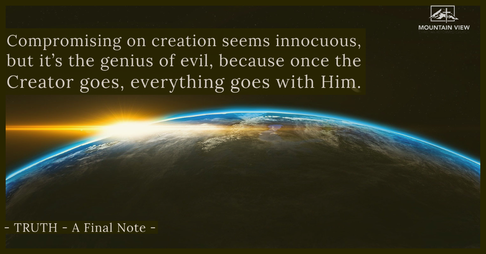 I’ve written now a few times about truth, but I just have a few more thoughts on how it’s impacting our world. In that way, it’s hard to argue for a certain passage of Scripture being more important than another, because it’s all God’s Word, testifying to us of Jesus. However, the first chapter in the Bible provides the undergirding for everything we believe and everything which society needs to properly function. Clearly, it’s not all spelled out in detail there, but what I mean is this: when a Creator is lost, everything is lost. Without a Creator God establishing and maintaining a created order, there is no basis for morality, no basis for laws, rules, relationships, purpose, or anything else. Nothing could be more dangerous than to do away with the concept of creation. Yet for centuries now the whole idea of creation is scoffed at. It’s been replaced with the old Gnostic ideas of the material as bad and the spiritual as good, or it’s been mocked at by those who believe in the evolution arising from a primordial ooze. I know there are some wonderful Christian teachers and believers who hold to some form of creation-based-evolution, but that’s not the point. The point is to say that if we remove creation altogether, if we remove God altogether, then we lose everything. If there is no set of governing laws in this universe as given by a Creator, then we are simply moral-less beings. What, then, is the objective standard by which anything is judged? Why is there a US Constitution? Why police? Why churches? Why respect in the societal sphere? Why stop signs and red lights and borders and the like? What objective metric is used for scientific conclusions? Why does life have value? By trying to remove God, society itself is undermined, and this is what is actively taught and promoted in our schools and from our government. Everything listed above has been openly attacked in the last year, because many in power have drunk so much of it that they’ve lost sight of their fallen mortality. Compromising on creation seems innocuous, but it’s the genius of evil, because once the Creator goes, everything goes with Him. So much more could and should be said about this, but if we want to see any change in this world, we Christians need to get back to the basics of our faith, to learn them well and defend them fiercely. They’ll call us bigots for doing it, but that simply betrays their own argument, because we can only be bigots if there’s an objective standard of truth. And if there’s an objective standard of truth, there’s a Creator God behind it.  With our final blog on truth, we want to look at how it manifests itself in this world. That is, is truth a Bible-thumping Christian that must always have a quick comeback for everything and consistently accost people in the store by saying, “You think a sale on milk is good? You know what’s even better? – Jesus”? Or, is it being a citizen that believes “#loveislove” and that love is, at its core, acceptance? As we answer that, let’s once again reassert the undeniable: there is objective truth, and that objective truth is revealed in Scripture. What Scripture then tells us in Isaiah 5:20 is this: “Woe to those who call evil good and good evil, who put darkness for light and light for darkness, who put bitter for sweet and sweet for bitter!”. Put simply: we must get our truth right, or there is God’s own “woe” of fury upon us. We then get that truth right by humbly submitting to God’s written Word and, as it bears witness beyond itself, to God’s living Word – His Son, Jesus. So how do we go forward as Christians in a post-modern world? How do we as believers handle questions of homosexuality, transgenderism, and all the policy-driving questions of today? The Bible tells us that we must “speak the truth” – that is, we can never shy away from it; if the Bible says it, we must affirm it. But this truth must be spoken “in love” (Ephesians 4:15). Vital to this conversation, then, is a definition of love, because too often we hear fellow believers embrace anti-biblical ideas along the lines of, “a loving God wouldn’t do such and such”. But truth in its very nature divides. It draws a line of yes or no, reality or unreality, what is and what is not. A sovereign God will certainly do things we don’t like, which is why we need to seek His revealed will in His Word. But it’s also necessary to remember, then, that the Bible tells us that “God is love” (1 John 4:8). So how is love defined? 1 Corinthians 13 defines it in what seems today to be a radical way. Just see how counter-cultural it is. “4 Love is patient and kind; love does not envy or boast; it is not arrogant 5 or rude. It does not insist on its own way; it is not irritable or resentful; 6 it does not rejoice at wrongdoing but rejoices with the truth. 7 Love bears all things, believes all things, hopes all things, endures all things” (1 Corinthians 13:4-7). Now, this passage exists in ubiquity. It’s at weddings, slapped on decorations, and even quoted often enough on television. But this leads to a lack of a careful reading. Notice again how love is defined here: love “does not rejoice at wrongdoing but rejoices in the truth”. What this means is that in world of acceptance, true love has at its core an intolerance. That is, an intolerance for all distortions of love. According to Scripture, we cannot actually love someone if we promote anything less than truth. So, what are some perversions of love?  Last time we looked at truth, and how the Bible reveals it as the beginning, middle, and end of a matter. Today we want to ask, “Where can we find this truth?”. And I think this is a pertinent question today, because we’re seeing two sets of facts for everything, and legislation is passed on the concept of an alternate reality. How, then, shall we go forward? Upon what do we place our trust? The Bible tells us in Isaiah 65:16 that the answer is the God of the Scriptures. Why? – Twice there He is called the “God of truth”, and the book of James tells us, “Every good gift and every perfect gift is from above, coming down from the Father of lights, with whom there is no variation or shadow due to change”. Romans 1:25 even draws a distinction between sinful man and perfect God when it says, “they exchanged the truth about God for a lie”. It’s because of this that John Calvin wrote, “Nothing is deemed more precious by God than truth”. Indeed, remember that word “emet”, which means “truth”? – It is also translated as “faithfulness”, meaning when you read of the steadfast love of the Lord or the faithfulness of the Lord – as frequently found in the Psalms – it’s saying that truth is at the core of who God is. But where can we find the revelation of this truth? – In the self-disclosure of God’s Word, both written and living. We’re told in Psalm 12:6, “The words of the Lord are pure words”, and 2 Timothy 3 and Hebrews 4 state that the Bible is useful for growing, teaching, rebuking and changing – not just our behaviors, but our very motives and thoughts, because the Lord is actively speaking to us as we engage with it. 2 Timothy 3:15 even calls the Bible “the Word of truth”, and Jesus says, “[God’s] word is truth” (John 17:17). It may not – as I brought up last time – prove that vanilla is the best flavor of ice cream, but it will define and shape our worldview and our being around what is objectively true. But notice also that the Scriptures are not bearing witness to themselves but their true author: God. When we read the Word, we must do so using it to interpret itself lest we try to twist the truth to define our own reality, as Adam and Eve once again did at the Tree of Knowledge of Good and Evil. God’s Word is His truth revealed, and so it must shape how we feel and think and act. And if it does, the Lord promises that He “will make straight our paths” (Proverbs 3:6). It’s why elsewhere, the Psalmist proclaims, “Your Word is a lamp unto my feet and a light unto my path” (Psalm 119:105). That path is always leading somewhere, and that somewhere is back to the living word: Jesus. The Scriptures declare him “the Word” (John 1:1), and the “the image of the invisible God” (Colossians 1:15) in whom “all the fullness of God was pleased to dwell” (Colossians 1:19). He is truth incarnate. What’s happens when we reject him, then, is that we stumble through life without ever knowing our created purpose, and those who do so will always run the opposite way. As an example, let’s go back to Jesus standing before Pilate, and witness the ironic and tragic scene. As he stands trial, Jesus says, “I have come into the world – to bear witness to the truth”. What amazing words! Everything we desire, everything God wants us to know this side of glory, bound up and found in Jesus. Yet Pilate sneers back, “What is truth?” (John 18:37-38). In the next chapter he then says, “Do you not know that I have authority to release you and authority to crucify you?”, and Jesus responds by saying, “You would have no authority over me at all unless it had been given you from above” (John 19:10-11). Now, there we have the powers of the world standing against the powers of God. And what’s the fundamental difference? 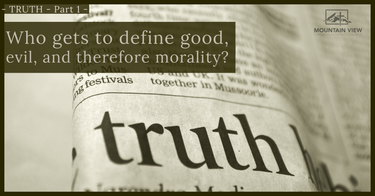 Gustave Flaubert, a French novelist, once famously said, “There is no truth. There is only perception”. Of all crazy and damaging ideas that have plagued this world, this is perhaps the worst and yet most widely accepted. For example, Syd and I have been watching a docuseries on Scientology, and their main assertion is, “What’s true is what’s true for you”. But how can this be possible? It seems a badge of honor, a mark of integrity to challenge the concept of truth itself. You are seen as a bigot and an “[insert prefix here]-ism” if you defend the idea that there is objective, moral truth in this world. It’s why we even live in what’s called the “post-modern” age, as postmodernity is “characterized by broad skepticism, subjectivism, or relativism” (https://www.britannica.com/topic/postmodernism-philosophy). Yet for the Christian who believes in objective truth and hangs our entire existence upon it, this is nothing new, because the third chapter of Scripture details that mankind would rather reject truth than shape themselves around it. That is, Adam and Eve stood around the Tree of Knowledge of Good and Evil, which in sum represents the question of who gets to define good, evil, and therefore morality. Desiring this ability for themselves, they reached out, ate the fruit, and the fallout is evident. Immediately there is shame, slander, and a curse. We need only travel a chapter more to see the first murder before reading of the wicked acts of a man like Lamech. Genesis 5 then is a depressing read that contains the phrase “and he died” 8 times, before Genesis 6 proclaims, “every intention of the thoughts of [man’s] heart was only evil continually” (Genesis 6:5) When we reject truth, we reject reality itself, and ever since Adam and Eve decided to reach out and be their own moral compass, mankind has been wrestling with the question of who determines truth, and that always leads to chaos. This is why, whenever the topic of truth arises, it’s difficult not to place ourselves with the jeering crowd before Jesus, as we watch his interrogation at the hands of Pontius Pilate. Jesus had stated that he’s come “to bear witness to the truth”, but Pilate sneers back, “What is truth?” (John 18:37-38). What he’s saying is, “What’s true for the Jew is not true for the Roman”, and it reveals that Pilate is metaphorically reaching out with his ancestor to pluck that forbidden fruit and define for himself good, evil, and morality. This is, at the very base, what is wrong with our world today. Romans 1:18 tells us that it’s by our unrighteousness that we suppress the truth. Yet one verse before he says that “righteousness comes by faith”. In other words, to not have faith in Jesus ultimately leads to unrighteousness, a suppression of truth, and “Claiming to be wise, they became fools” (Romans 1:22). That’s why I’ll write on the essence of truth and its manifestation in true love in coming weeks, but for today let’s simply define truth. 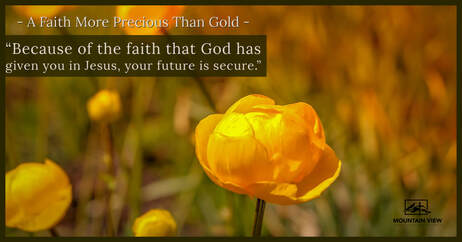 Perhaps 2020’s most commonly used phrase was, “These are uncertain times”. It seems, however, that 2021 is quickly removing the “un” as we see an ever-increasing polarization in our country. It’s troubling, of course, to see what’s happening in our government, and as inheritors of God’s eternal Word, it is the job of the Church to pray for and remind them of their Scriptural mandate (Romans 13:4, 6). However, it is also the job of the Church to not identify ourselves more as citizens of America than citizens of heaven (Philippians 3:20). As I’ve been following the news and speaking with many of you, it’s become clear that the news cycle is close to everyone’s mind. This past Sunday in catechism, while discussing providence, I wagered that each of their homes had been filled with talks of what’s been happening in the US. Suddenly, each looked up, eyes rolled, and every head nodded vigorously. There was great uncertainty last year, but it feels like now we can bank on one certainty: the heart of man will prove its wickedness, no matter its political ideology. Given the increasing evil and immorality, one of the verses that has been of immense comfort to me is 1 Peter 1:7, wherein the Apostle describes our faith as “more precious than gold that perishes though it is tested by fire”. What a contrast to the hopes of many in our world! Money is power in America, but in the talks of redistribution of wealth, capitalism versus socialism, equality of outcome, taxes, etc., you and I have the universe’s most precious gift: faith. Faith in Christ – though it be tested by the fires of evil – is the assurance that this world is not our home (Hebrews 13:14), and that we are seen and loved by a God who “removes kings and sets up kings;” (Daniel 2:21), who stands age to age the same (Isaiah 40:28, Psalm 90:2, Hebrews 13:8, Revelation 22:13), who is “merciful and gracious, slow to anger and abounding in steadfast love” (Psalm 103:8) who never leaves and never forsakes (Deuteronomy 31:6, Hebrews 13:5), who experientially knows our pain and suffering (Hebrews 4:15, 5:7-8), and who has redeemed us through the invaluable blood of Jesus (1 Peter 1:18-19). Continued... 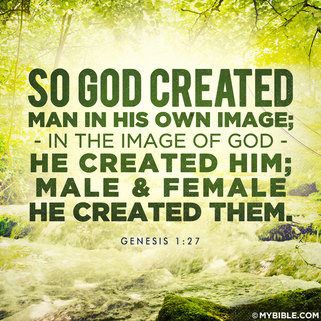 What more can be said than has been said? – The state of our country is devastating. When we look at the physical, financial, and emotional trauma of the coronavirus, it felt like a crippling blow. Yet without hardly a breath between, we then witnessed the murder of George Floyd, and a pent-up frustration exploded across the nation. We should in no way condone looting and rioting, but the protests bring before us something long simmering on the backburner that we must confront in all its forms: racism. I understand that there are many out there who are turned off by what they’ve been seeing, and there are many who read politics into the situation. I, for example, fundamentally disagree with defunding and villainizing the police, and I disagree with the idea that America is inherently racist through-and-through. However, that is a different discussion. The reality is that while we may not be sitting in the 60s or the era of slavery, racism is alive and well, and it is an evil that corrupts everything it touches. To be sure, there are few things that stand so directly opposed to the gospel more than racism. When the Scriptures opened by detailing God as Creator over all, and then telling us that mankind was created in His image (Genesis 1:27), it definitively put to rest any idea that one human could in any way be lesser than another. What gives us worth and value is not skin color or wealth or social standing. Rather, what gives us inherent worth is being “fearfully and wonderfully made” in God’s image (Psalm 139:14). Continued... 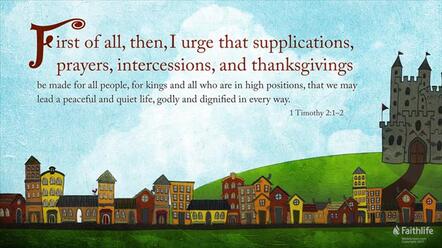 The pain and division coursing through our country right now is deeply heartbreaking, and for this blog I simply want to say two things. The first is that the racism that can sit in the heart of all humans should cause us to mourn and grieve. All politics aside, both racism and the rioting, looting, and destruction we're seeing are antithetical to everything Scripture commands. As such, I urge you to pray. Pray for unity in this country. Pray for healing, but a healing that comes from God. Pray for the Church to speak decisively into this pain, but that we will eagerly listen and learn how and when to speak. Pray that God will crush racism and racist ideas, for even a whiff of racism stands completely opposed to the gospel. Pray for our government, but pray that the Church will be active in supplying a place of grace and healing. Finally, pray that God’s will is clearly visibly throughout even this. Our hope is not in a unity structured by borders and leaders, but a unity established by the blood of Christ. “9 After this I looked, and behold, a great multitude that no one could number, from every nation, from all tribes and peoples and languages, standing before the throne and before the Lamb, clothed in white robes, with palm branches in their hands, 10 and crying out with a loud voice, ‘Salvation belongs to our God who sits on the throne, and to the Lamb!’ 11 And all the angels were standing around the throne and around the elders and the four living creatures, and they fell on their faces before the throne and worshiped God, 12 saying, ‘Amen! Blessing and glory and wisdom and thanksgiving and honor and power and might be to our God forever and ever! Amen’” (Revelation 7:9-12). The world does not need our politics or opinions; it needs our Savior. Continued... 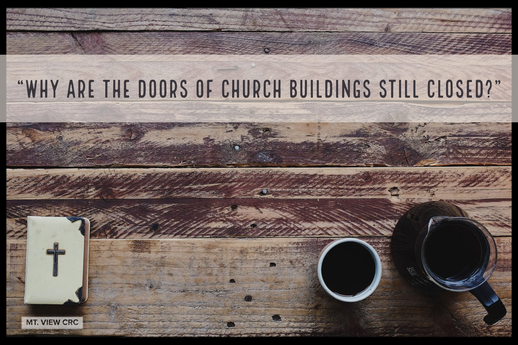 There’s so much pain and confusion in the Church today, and we certainly weren’t aided by President Trump’s comments this past weekend. I praise God to hear a President say what he did. It is true; it is vindicating; it is necessary. But at the same time, it frustrates me to wonder why he didn’t say these things back in March. With that, one revelation that was particularly betraying was when he called on the governors to acknowledge what you and I have known since Day 6 of creation: that the Church is essential. Unfortunately, by appealing to them, he acknowledged that because we are the “United States” – and not the “Autocratic State” – of America, the individual governors have more authority over their State than Trump does. So while the President may have waxed his eloquence a few months late, it also rubbed salt in the wound of many, because it brought to mind the question we’ve been asking for weeks on end: why are the doors of church buildings still closed? I know that the answers to the question are varied and testily debated, but at least in my mind, it’s straight-forward: it has little to do with the coronavirus and much to do with the Bible. That is, the Bible has told us to be subject to our governing authorities (Romans 13:1-2, 1 Peter 2:13-14). The caveat is that if the government tried to silence the message of the gospel (an act not yet carried out), we would be forced to serve the higher law: obedience to Christ above obedience to this earthly government. However, following that same logic, when the message of the gospel is not outlawed, and when we can fully obey both God and our government (despite certain hindrances), we are called to do so despite the cost. After all, when the Spirit inspired Paul and Peter to write those words, I do not think He had the First or Second Amendment in mind. He had His Kingdom in mind. He knew that there would be great injustices and abuses that would at times impede the ministry of the Church. Yet being a God of order, He placed us under the authority of the government, and has called us to be obedient to Him by being obedient to them. Now, that is not to undermine what a difficult time this has been. I don’t know a single Christian or Pastor that wants to keep from meeting in person. We missed Easter; that was devastating. We will likely miss Pentecost; that is just as gutting. That doesn’t even take into account the friendships and relationships, the power of singing together and approaching the Bible and prayer with each other. It doesn’t touch on how heart wrenching this has been for Christians, but as Ephesians 6 says, our issue is not with flesh and blood. God knew how difficult this time would be, and yet He brought us into a unique puzzle: the gospel has gone out in perhaps greater force and availability during this time, and yet certain aspects of the Church have been unavailable to us. In that way, we cannot categorize this as persecution, but we certainly can say that we’re suffering. So what can God be teaching us? Continued... |
AuthorMy name is Bryan Lanting. I am a graduate of Reformed Theological Seminary, and I am presently serving Mt View CRC as their pastor. I am married to a wonderful wife named Sydney, and both of us are loving life, loving Lynden, and loving the Lord! Archives
October 2021
Categories |

 RSS Feed
RSS Feed